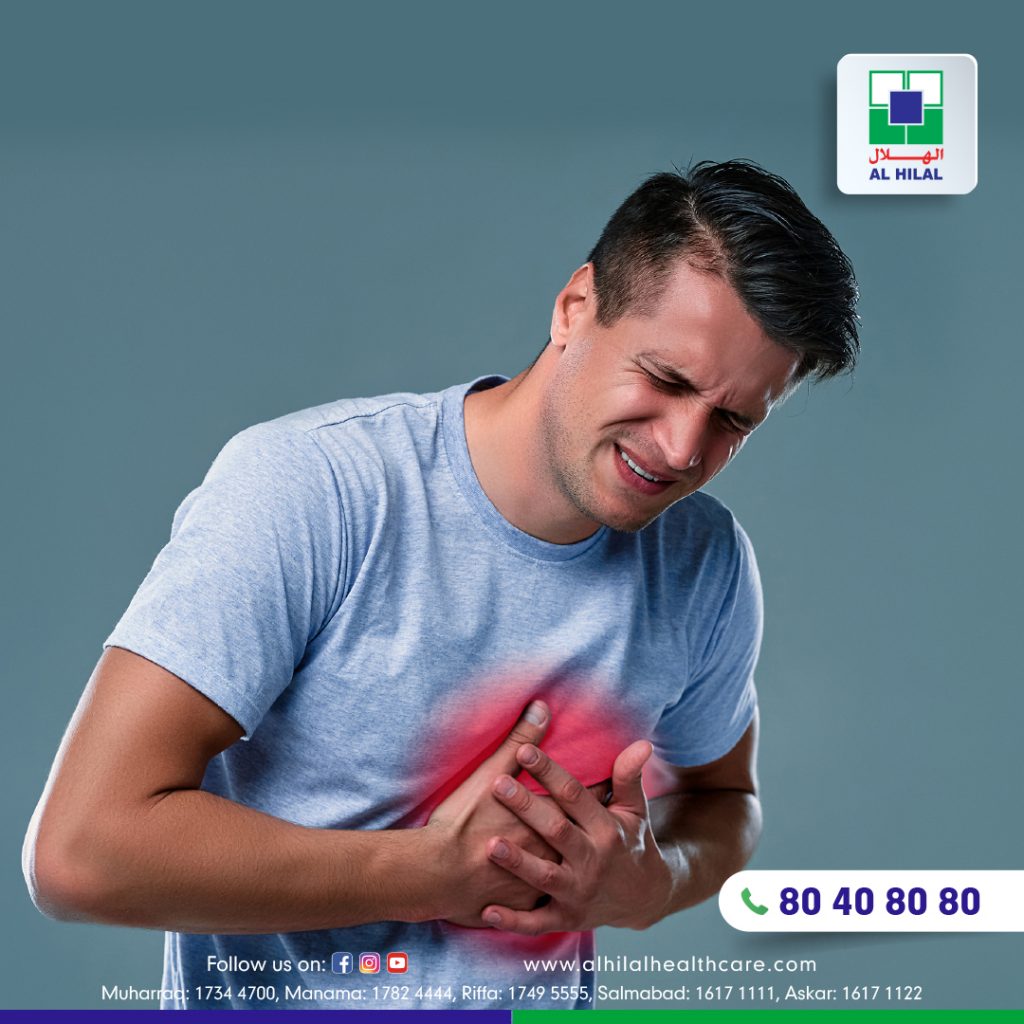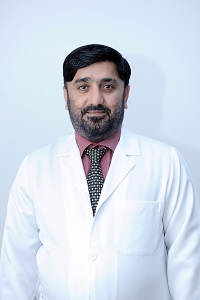Heart attack, also known as myocardial infarction, is a serious medical emergency, that happens when blood flow to heart is severely blocked or reduced. The blockage is usually due to build-up of cholesterol, fat, or other substances in the coronary arteries.

Click here for more information about heart attack- by Dr. Muzafar Ali Surhio, consultant Cardiologist, Al Hilal Hospital, Bahrain.
For consultation regarding heart attack or any other cardiac issue, contact Al Hilal Hospital, Department of Cardiology today and get an appointment with the best Cardiologist in Bahrain.
For your convenience, our representatives are also available on WhatsApp helpline, in Al Hilal Manama, Salmabad, Riffa and Muharraq branches. We offer exclusive packages and privilege cards for additional benefits- to provide affordable yet exceptional healthcare services to all our patients.
Symptoms of Heart Attack
Symptoms of heart attack differ from patient to patient- some have mild symptoms, some have severe and others have none. Some common symptoms of heart attack include:
- Cheat pain that feels like tightness, pressure, squeezing, pain, or aching
- Discomfort or pain spreading to arm, shoulder, neck, back, teeth, jaw, or upper belly
- Cold sweating
- Fatigue
- Indigestion or heartburn
- Sudden dizziness or lightheadedness
- Shortness of breath
- Nausea
If you have one or more symptoms of heart attack mentioned above, especially sudden dizziness, cold sweating and chest pain, contact Al Hilal Hospital, Department of Cardiology immediately. Our representatives are also available on WhatsApp helpline, in Al Hilal Manama, Salmabad, Riffa and Muharraq branches.
What causes a Heart Attack
Sudden interruption in blood supply to the heart- this is what causes a heart attack. Without blood supply, heart muscles are damaged and begin to die. If left untreated, heart muscles experience irreversible damage and once major portion of the heart is damaged, it stops beating and causes death- also known as cardiac arrest.
The leading cause of heart attack is coronary heart disease (CHD)- a condition in which coronary arteries get clogged by deposits of cholesterol, called plaques. One of the plaques bursts before a heart attack, forming blood clot at the site of rupture. The clot might block blood supply to the heart and trigger a heart attack. CHD risk is increased by:
- High-fat diet
- Smoking
- High cholesterol
- Diabetes
- Hypertension (high blood pressure)
- Obesity or being overweight
Other less common causes of heart attack include drug misuse and hypoxia (lack of oxygen in blood).
Click here for more information about heart attack- by Dr. Muzafar Ali Surhio, consultant Cardiologist, Al Hilal Hospital, Bahrain.
What happens after a Heart Attack
It is often asked ‘what happens after a heart attack?’. When someone gets a heart attack, it is important to get early and effective treatment to limit damage to the heart muscle. Majority of heart attacks occur because of sudden blockage of arteries- getting immediate medical attention can minimize the risk of further and permanent damage to the heart and arteries. If you suspect a heart attack, consult an expert Cardiologist for urgent diagnosis and treatment.
6 signs of Heart Attack a Month Before
Following are 6 signs of heart attack a month before it happens:
- Uncomfortable pressure in chest
- Pain in other parts of body
- Sudden dizziness
- Heart palpitations
- Indigestion and nausea
- Sweating
These are the warning signs from the body; however, they can be easily mistaken for some other ailments. Identifying them and getting early intervention can make a major difference in health condition of the patient.
Click here for more information about heart attack- by Dr. Muzafar Ali Surhio, consultant Cardiologist, Al Hilal Hospital, Bahrain.
Heart Attack Prevention
Heart attack prevention techniques mainly include changes in lifestyle- a responsible and healthy lifestyle is the only defense against heart attack, but also other heart diseases. Following are some steps, that can lead to better health:
- Quit smoking
- Have nutritious meals
- Keep a check on blood cholesterol
- Keep blood pressure in optimum range
- Stay physically active
- Maintain healthy weight
- Manage diabetes
- Work on reducing stress
- Limit alcohol
Heart Attack Treatment
Following are commonly used heart attack treatment methods:
- Angioplasty
- Artificial heart valve surgery
- Angioplasty
- Bypass surgery
- Atherectomy
- Heart transplant
- Cardiomyopathy
- Radiofrequency ablation
- Minimally invasive heart surgery
- Stent procedure
- Transmyocardial revascularization (TMR)
For consultation regarding heart attack or any other cardiac disease, contact Al Hilal Hospital, Department of Cardiology today and get an appointment with the best Cardiologist in Bahrain.
Al Hilal Hospital, Department of Cardiology
If you have symptoms of heart attack or any other cardiac disease, consult an expert Cardiologist at the earliest. At Al Hilal Hospital, Department of Cardiology, we have highly qualified and experienced doctors, state-of-the-art laboratories, and modern equipment, to provide early detection and treatment options for all patients.
Contact Al Hilal Hospital, and get consultation with the best Cardiologist in Bahrain, for heart attack as well as other cardiac diseases. For your convenience, our representatives are also available on WhatsApp helpline, in Al Hilal Manama, Salmabad, Riffa and Muharraq branches.
We offer exclusive packages and privilege cards for additional benefits, to provide affordable yet exceptional healthcare services to all our patients.


